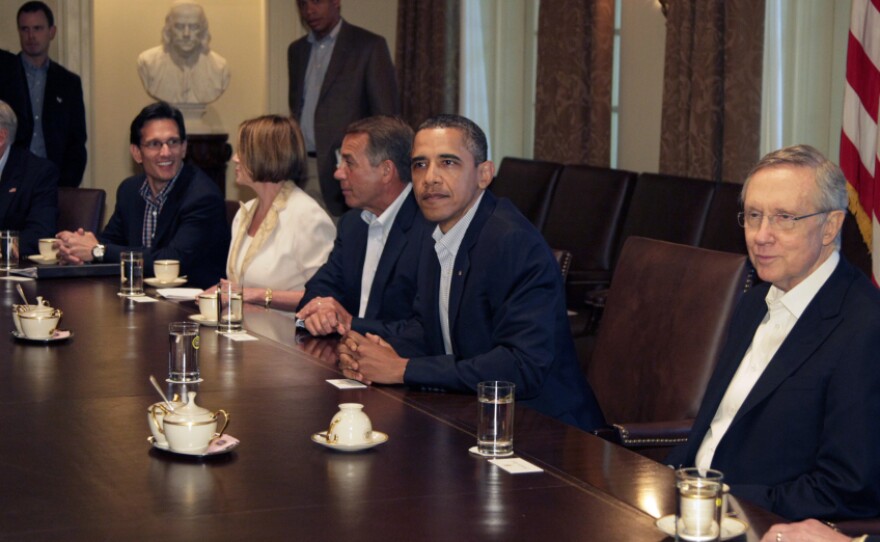As the deadline for Congress to raise the debt ceiling creeps steadily closer, a deal to cut the size of government in exchange for raising that debt limit seems as far away as ever.
If a White House meeting Sunday night resulted in progress, neither side said so publicly.
The weekend's biggest development was more of a breakdown than a breakthrough. Senior congressional Republicans said they would not support an ambitious plan to cut $4 trillion over a decade that could include major changes to the tax code and entitlement programs such as Social Security, Medicare and Medicaid.
President Obama and congressional leaders sat around the Cabinet table for the start of the negotiating session.
"Can you work it out in 10 days?" a reporter asked Obama as journalists were being escorted from the room.
"We need to," Obama replied.
Seventy-five minutes later, the session was over and the participants left without speaking to the media.
According to a Democratic official familiar with the meeting, the president urged Republicans not to give up on the $4 trillion deal, arguing that a smaller agreement would not be any easier politically.
"It's baffling that the president and his party continue to insist on massive tax hikes in the middle of a jobs crisis while refusing to take significant action on spending reductions at a time of record deficits," said Don Stewart, spokesman for Senate Minority Leader Mitch McConnell, after the meeting.
The parties are scheduled to return to the White House for more negotiations Monday, and Obama will hold a morning news conference to discuss the status of the talks.
If Congress does not raise the debt ceiling by Aug. 2, the U.S. could default on its financial obligations.
"The credit rating agencies around the world have said if Congress doesn't act by the 2nd, they will downgrade our credit," said Treasury Secretary Timothy Geithner. "If that happens, you're going to see catastrophic damage across the American economy and across the global economy," he told NBC's Meet the Press on Sunday.
Just a day earlier, the outlook for a grand bargain was much sunnier.
When Obama left the White House for Camp David on Saturday, he told the American people in his weekly address: "We have an extraordinary — and an extraordinarily rare -– opportunity to move forward in a way that makes sure our government lives within its means, that puts our economy on a sounder footing for the future, and that still invests in the things we need to prosper in the years to come. I'm hopeful that we will rise to the moment."
By the end of the day, that hope had waned. House Speaker John Boehner called the president from Ohio on Saturday evening to say the ambitious deal both men thought possible cannot get through the House because the bargain would include tax increases that Republicans won't sign on to.
In a statement, Boehner said, "The White House will not pursue a bigger debt reduction agreement without tax hikes. I believe the best approach may be to focus on producing a smaller measure."
That proposal would be in the range of $2 to $3 trillion, without the fundamental restructuring of government programs that could be part of the larger plan.
White House Communications Director Dan Pfeiffer followed with a statement saying, "We cannot ask the middle class and seniors to bear all the burden of higher costs and budget cuts. We need a balanced approach that asks the very wealthiest and special interests to pay their fair share as well."
White House Chief of Staff Bill Daley said Sunday that the president is not giving up on the larger package. "A number around $4 trillion is a number that will make a serious dent in our deficit," he told ABC's This Week.
But Sen. McConnell said the big deal is off the table. "Everything they've told me and the speaker is that to get a big package would require big tax increases," McConnell told Fox News Sunday.
Copyright 2022 NPR. To see more, visit https://www.npr.org. 9(MDAzMjM2NDYzMDEyMzc1Njk5NjAxNzY3OQ001))







